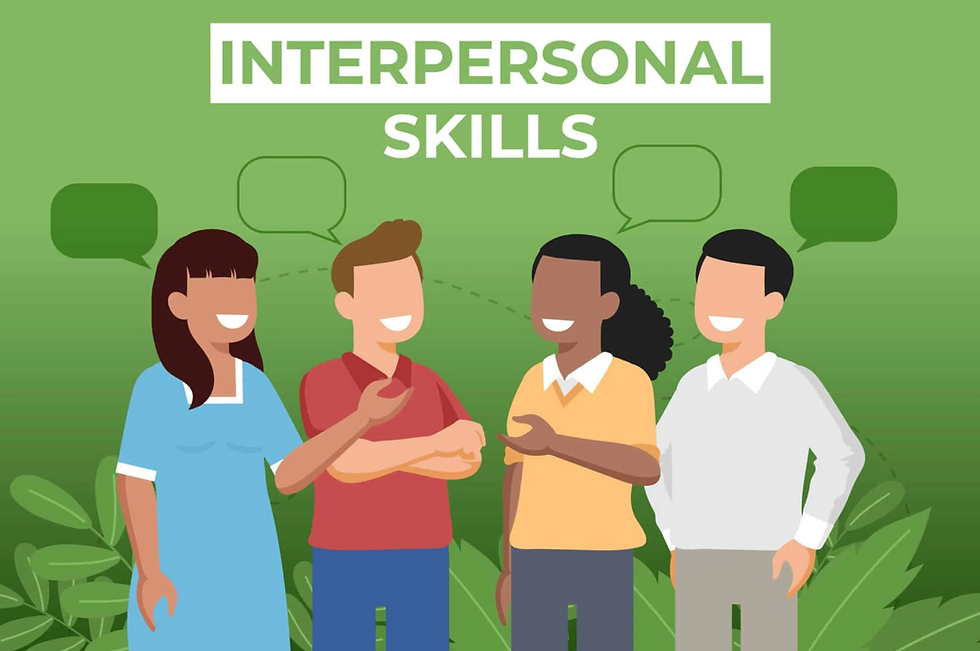- Interpersonal skills significantly enhance IT professionals' career prospects and workplace relationships.
- Employers highly value key communication, teamwork, and emotional intelligence skills.
- Continuous improvement of interpersonal skills is essential for long-term success and adaptability in the IT industry.
Picture this: You Walk into a job interview with gum in your mouth, casually stained shirt, and slouching in your chair while chatting informally with the interviewer. Not the best look, right? It leaves the interviewer questioning your professionalism and seriousness about the job. Now, imagine a different scene where you show up in a crisp, white, ironed shirt, confidently sit upright, and speak clearly and respectfully. This time, you exude professionalism and respect for the opportunity. The contrast between these two scenarios highlights the importance of interpersonal skills in shaping perceptions and outcomes.
Meaning of Interpersonal Skills
Interpersonal skills are the skills applied when dealing with other people. They refer to a broad domain of behaviors and skills related to proper interaction, cooperation, and conflict handling. Whereas technical skills refer to employees' ability to perform certain activities, interpersonal skills can be applied in diverse settings and industries.
Key Interpersonal Skills and Their Importance
1.Communication
Communication is name of clearly and efficiently passing information from the source to the intended receiver. It's about making sure your ideas are understood as intended, reducing misunderstandings. A study by LinkedIn found that 92% of hiring managers consider communication skills crucial for job candidates.
In IT, communication is crucial in relating technical details that could be incomprehensible to non-IT professionals. The technical communication skills that IT professionals require involve:
- Writing accurate and concise technical reports and manuals.
- Creating good business proposals.
- Presenting abilities in the organization's meetings with other managers.
2.Teamwork
Teamwork includes how individuals and groups cooperate to accomplish specific tasks or objectives. It encourages employees tyo work together by sharing talents and ideas to achieve common organizational goals. According to NACE research, 78% of employers seek applicants who are excellent in teamwork. For software to be developed, the developers, designers, testers, and project managers must work together to meet the deadlines and due dates and provide quality products.
3.Emotional Intelligence
Emotional intelligence involves regulating one's emotions while recognizing and regulating other people's emotional states. Communication is thus essential in managing relationships, managing stress, and making good decisions. Examples of emotional intelligence are empathy, self-regulation, and social awareness.
While applying to the IT sector, emotional intelligence assists individuals in managing the pressure typical for different projects, which are usually time-sensitive and require problem-solving. They also help deal with administrative corruption and ensure a healthy workplace tone and atmosphere.
4.Problem-Solving
Solving a problem involves identifying potential challenges and implementing solutions to those potential problems. Skills that are integral to people help them deal with challenges and accomplish their objectives. These skills include analytical thinking, creativity in problem-solving, and tenacity in problem-solving.
Problem-solving skills are essential for IT specialists, especially when writing a program, testing it, or trying to find the root of network problems and define how to solve them.
5.Conflict Resolution
Conflict resolution is the ability to mediate disputes and find mutually agreeable solutions. Effective conflict resolution ensures that disagreements do not escalate into larger issues and that all parties feel heard and respected. Examples include negotiation, active listening, and diplomacy. Employment-related conflicts in IT teams can occur due to employee disagreements or a misunderstanding regarding technical decision-making and the project's direction. Ideally, such disputes should be resolved since they prevent disruption of the team and project delay.
6.Leadership
Leadership is another challenge that concerns coordination and motivating people to accomplish specific objectives. The presence of a good manager and directed supervision empower employees while promoting unity and enhancing an organization's performance. Examples include giving directions on how tasks will be accomplished, encouraging course members, and modeling how activities should be done.
Managers and those above that level must motivate their staff, plan and control project-related resources, deal with all the issues connected with the project's area of responsibility, and keep the team from demotivating.
7. Persuasion
Persuasion is changing other people's attitudes and behaviors. Success in gaining support for ideas and initiatives related to change requires persuasion skills. Some of them include providing adequate reasons, bargaining for certain conditions, and persuading people.
In IT, professionals may have to convince others to embrace change, accept funds expenditure, or support specific objectives. Understanding how to persuade can help implement changes and innovations at a sanitary-pioneer level.
8. Decision Making
Decision-making can be defined as the selection of choices through the determination of the outcomes. Analyzing the manpower required for good decision-making skills is essential to selecting the proper strategy that would lead to the desired outcomes. Some examples that can be included are making choices, assessing options, accepting the consequences, and decision-making.
Managers and IT specialists often encounter scenarios that entail decisive choices regarding the timeframes and cost constraints of specific projects and technology implementation. Hence, proper decisions are needed to help achieve the projects on time and within a given budget.
9. Adaptability
Adaptability is the readiness to create new solutions to new conditions and problems. It enables people to continue being productive in dynamic and unpredictable situations—for instance, flexibility in a dynamic environment, receptiveness to innovation, or adaptability during mishaps.
In the IT industry, technology is constantly improving. Specialists must learn new tools and approaches to work and change often because this approach guarantees their efficiency.
10. Collaboration
Collaboration may be referred to as cooperation since it involves the grouping of individuals into teams to accomplish certain objectives. It improves the efficiency of the flow of information and dissemination of knowledge and other resources, hence improving the results and ideas developed. Collaboration includes such aspects as division of work, inclusion of all the participants' opinions, and decision-making.
In Information Technology projects, inter-departmental synergy is highly advisable since the users of the products under development are spread across several departments, such as the development, operational, and marketing departments.
Experiences and Insights By Ruqaiya Wadood
Ruqiaya Wadood, the HR head at Fortray, comprehends that employment is not a mere assortment of checking off forms. Over the years, she has acquired that there is nothing as critical as interpersonal skills when it comes to recruiters granting someone an opportunity to join his/her team. Below are some of the narratives from Ruqiaya's point of view, incorporating some quotes from her.
The Magic of Communication
Ruqiaya recalls, "When this candidate walked into the interview room, it was like a breath of fresh air. He did not limit himself to answering questions posed by the interviewer; on the contrary, he made people feel they were important to him. I especially appreciated his attentiveness and comprehensive analysis of the questions. I will never forget his words, 'I think one of the priorities of meaningful teamwork is the ability to understand one's team.
Indeed, how he communicated with people and his desire to work in a team quickly impacted me. Ruqiaya says, "His interpersonal communication with the team showed a progressive workflow, and working with him showed that he was not just an ordinary team member but an inspiring factor in enhancing the team's performance."
Leadership that Inspires
Ruqiaya describes another interview with enthusiasm. She said, “I was conducting interviews for a Project Manager, and the candidate impeccably told stories of how he managed projects with such zeal, 'My goal has always been to ensure that my team understands the goals and objectives of a project and also to ensure that they feel valued after the project is accomplished.' The candidate was right because his examples were evidence of a leader.
With his leadership and initiative, he did leave a good impression. Ruqiaya adds, "He had a way of motivating and nurturing his subordinates, which made a big difference in the fact that we witnessed the positive impacts of this aspect of his management style on the successful completion of projects."
Handling Criticism with Grace
Ruqiaya shares a memorable Online interview experience with a candidate. "She impressed us with her approach to criticism. When asked how she handles feedback, she confidently stated, 'I view criticism as a valuable learning opportunity. Constructive feedback helps me grow and improve.' Her openness and positive attitude towards feedback was refreshing."
Her excellent interpersonal skills and attitude toward criticism made her an immediate choice. Ruqiaya adds, "Her willingness to learn from feedback and positive outlook were exactly what we were looking for. She was hired on the spot, as we knew her approach would be a great asset to the team."
When Communication Falls Short
Ruqiaya reflects on an interview with a hint of disappointment: "There was one technically outstanding candidate, but he had severe communication problems. 'I have difficulty speaking – it is tough to explain what I want to say.'
He could have communicated better with the team, but this remained a major challenge to his work progress. As for this, Ruqiaya noted, "He was skilled but failed to perform; people skills appear to be just as important as the technical ones when making hires."
Handling Conflict: Sylvia Is a Missed Opportunity
In another interview, Ruqiaya mentions, "Conflict management was an issue for this candidate. She said, 'I always had a difficult time with colleagues whenever there were disagreements.' Her lack of emotional intelligence was worrying."
Here, she couldn't demonstrate the skills she possessed, and her conflict management method was a turn-off. Ruqiaya points out, "A glaring sign of rejection occurred probably due to her inability to avoid blame and demonstrate a professional way of handling conflict resolution skills.”
Common Gaps in Interpersonal Skills
Ruqiaya highlights several common gaps she observes:
Emotional Intelligence: "The competencies of controlling one's emotions and understanding the emotions of others prove to be difficult for many candidates."
Active Listening: "It's mainly in the area of listening; sadly, many times, people are not fully attentive, and even when they are, they are not responding appropriately."
Conflict Resolution: "The management of conflicts in a professional capacity is quite often under-presented."
Adaptability: "The employee's ability to adapt themselves and be flexible is a major concern, but often unmet."
Developing Interpersonal Skills
Personal and interpersonal skills can only be developed and enhanced through constant practice and much awareness. Here are some strategies to help you develop these essential skills:
Self-Reflection: Make it a habit to review the dynamics of the interpersonal relationships observed to find areas for remodeling. It may be useful to start writing a journal to document changes in behavior and other aspects.
Seek Feedback: Ask friends, coworkers, and other professionals for their opinions to discover the positive and negative things that can be said about you. Constructive criticism is an effective way to get useful advice regarding one's self-improvement.
Practice Active Listening: Attempt to interpret the whole content of what the speaker is saying before churning out an answer. This includes avoiding interrupting the speaker as they continue with their speech and showing the speaker that you are interested in everything they have to say.
Engage in Team Activities: Participate in corporate fun events, which can encompass team bonding exercises in and out of the workplace. These activities can enhance personal and interpersonal skills related to the tasks and foster ideal relations with others.
Develop Emotional Intelligence: Practice acknowledging your and others' emotions. Practices such as mindfulness or empathy training can boost emotional intelligence.
Enhance Problem-Solving Skills: Develop the skills needed to solve problems that arise in practice. This includes accepting to work on complex project briefs, coming up with ideas in meetings, and drawing from your personal experiences.
Improve Conflict Resolution Skills: Understand how people can overcome conflict.
Take Leadership Opportunities: Apply for a committee in any project or social activity or get elected as an officer. Managing a team or a project is also another way of going about it, as it enhances and displays leadership qualities.
Learn Persuasion Techniques: Implement peripheral appeals within your communication. This may concern skills such as knowing your target public, developing enthralling messages, and, finally, haggling.
Embrace Change: Be ready to embrace change and be a change. One specific advantage of change management is that the ability to adapt to change strengthens flexibility and performance.
Interpersonal Skills in Online Interviews: Leaving a Corporate Impression
It is most common to conduct interviews via online media, and it is mainly adopted widely in the IT domain. Such virtual means of communication create intriguing conditions and possibilities, specifically concerning the demonstration of interpersonal skills. However, such geographical separation does not eliminate the need to cultivate a professional manner, with interpersonal skills being the most important.
Key Interpersonal Skills for Online Interviews
1.Effective Communication Appropriate communication skills are as important in online interviews as they are in face-to-face interviews. Ensure your thoughts and ideas can be clearly understood, and avoid overelaboration and lengthy explanations that are likely to be misunderstood. Incorporated in the LinkedIn survey, 92% of hiring managers stated their sentiments for communication skills as highly important.
2.Active Listening In a virtual environment, people can easily get distracted. Use appropriate nonverbal communication throughout the interview by either nodding or shaking your head, making eye contact despite being in front of a camera, and verbally affirming the points made by the interviewer. This makes the other person feel that you are interested and that you respect them.
3.Professionalism Follow the professional dress code, choose a proper place to sit for the interview, ensure that it is the most calm and quiet corner of your house and sit properly. These factors play a vital role in creating people's perception of you. According to a survey conducted by CareerBuilder, 50 % of employers rejected candidates based on their dress code during the interview.
4.Technical Proficiency Get comfortably acquainted with the video conference software, test your connectivity, and have a plan B if any issues arise.
5.Body Language A smile goes a long way. Maintain good posture and facial expressions and use minimal hand movements to portray confidence and passion. In a study by TalentNow, 47 % of the interviewers stated that body language of the candidate during the interview, is critical.
Survey Data on Key Interpersonal Skills Valued by Employers in Online
| Skill | Percentage of Employers who valued this skills |
|---|---|
| Communication | 92% |
| Professionalism | 50% |
| Technical Proficiency | 85% |
| Body Language | 47% |
| Active Listening | 67% |
Conclusion
Interpersonal skills are crucial in the IT field, allowing professionals to communicate effectively, collaborate with diverse teams, and lead projects to successful completion. By understanding and developing these skills, IT professionals can significantly enhance their career prospects, improve workplace relationships, and contribute to a more dynamic and innovative industry.
Expert Advice:
Develop the ability to clearly articulate ideas and listen actively to others. According to a 2020 LinkedIn survey, 92% of talent professionals and hiring managers reported that strong communication skills are essential for career advancement. Embrace teamwork by being open to diverse perspectives and leveraging the strengths of your colleagues. Research by Salesforce shows that 86% of employees and executives cite the lack of collaboration or ineffective communication as the main causes of workplace failures. Hone your leadership skills by taking initiative, inspiring others, and managing projects effectively.
A study by Zenger Folkman found that companies with strong leadership teams are 13 times more likely to outperform their competitors. The IT industry is constantly evolving. Stay flexible and open to change by continuously learning new technologies and methodologies. According to a report by CompTIA, 91% of IT professionals believe that tech certifications and continuous learning are critical for staying relevant in the industry. Develop your emotional intelligence by understanding and managing your emotions and those of others. Research published in the Journal of Organizational Behavior indicates that employees with high emotional intelligence are 40% less likely to experience workplace burnout and 67% more likely to receive positive performance evaluations.
Investing time and effort in honing your interpersonal skills is a worthwhile endeavor that can lead to personal growth and professional success. Whether you are an aspiring IT professional or a seasoned expert, continuous improvement in these areas will serve you well throughout your career. By focusing on these expert-recommended practices, you can build a strong foundation for long-term success in the IT industry.








